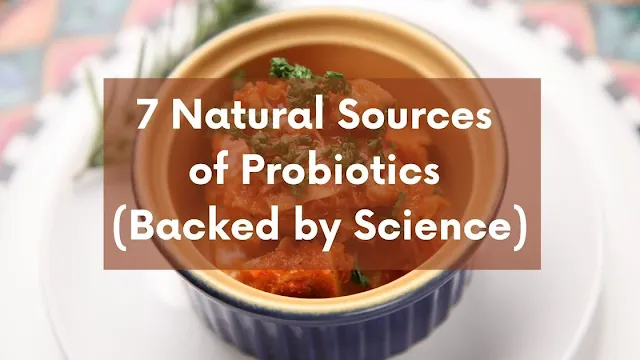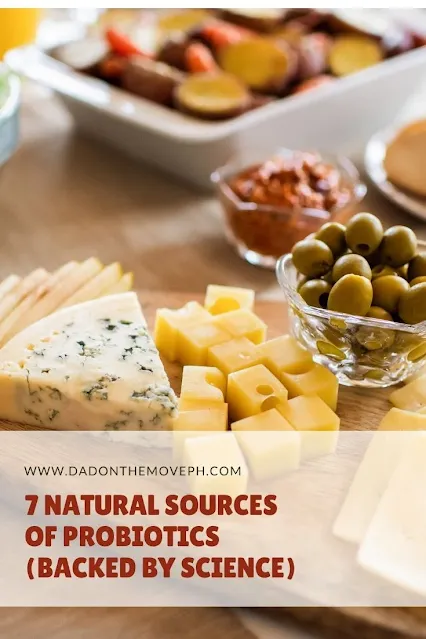7 Natural Sources of Probiotics To Keep Your Healthy While Traveling [Backed by Science]
November 22, 2021
Here are natural food sources of probiotics that you can consume to maintain your gut health.
Probiotics are live culture microorganisms that are packed with nutrients
and are the source of distinct health benefits. These bacteria perform
important tasks like digestion, vitamin production, and keeping away harmful
bacteria. Probiotics are associated with fermentation as it is mainly
present in fermented food products. It is the combination of different
bacteria and ones already present in the gut. The bacteria evident in
probiotics are Bifidobacterium, Saccharomyces, and Lactobacillus.
7 Natural Sources of Probiotics To Keep Your Healthy While Traveling [Backed by Science]
How Necessary Are Probiotics?
Probiotics aid good bacteria to keep away the bad bacteria from causing
illness. It helps to keep up the balance of the bacterial community in the
gut. Probiotics aids in boosting the immune levels in the body. They are known
to prevent diverse severe health conditions like:
- Periodontal diseases
- Weak Bones
- Hay fever
- Sepsis
- Constipation
- Inflammations
- Ulcerative colitis
- Antibiotic-associated diarrhea
How Does It Work?
Probiotics are not always helpful. They need to survive through the acidic
environment of the stomach to do the job. All the strains of bacteria cannot
reach the final destination. Analyzing which bacterial strain you are taking
from the probiotics determines its effectiveness.
The bacteria present in probiotics after entering the gut helps good bacteria
to keep away the negative influence of bad bacteria. Probiotics are
vitamin-rich and have fatty acid chains that are best suited for your health.
Sources of Probiotics That Have Greater Health Influence
Dietary and fermented food is the main sources of probiotics. They are healthy
and can be included in daily diet.
1. Cheese
Cheese is an exceptional reservoir of probiotics, and it keeps on improving in
its probiotic content as it ages. It has digestive benefits, and the good
bacteria present in the cheese can survive the gut environment.
All cheeses are not probiotic-rich, the fermented cheese is the best quality
probiotic. Probiotic-packed cheese includes Gouda, Swiss, Cheddar, Cottage
Cheese, Provolone, Gruyere, and Edam.
2. Kimchi
Kimchi comes traditionally from Korea, packed with nutrients and probiotics.
It is prepared by fermenting cabbages with added spice, garlic, onion, sugar,
and other vegetables. It is excellent for constipation, aging, common cold,
and weight loss. It is often served with rice or noodles and can easily be
prepared at home.
3. Kombucha
Kombucha is a fermented drink made from a symbiotic culture of bacteria and
yeast. It has a tangy taste and can be added to green tea. It has caffeine and
is filled with probiotic properties. The kombucha readily available in the
market can contain a high amount of sugar, which should be avoided.
4. Miso
Miso paste is prepared by fermenting soybeans and adding fungus koji. The
paste can be added directly to meats, vegetables, and soups. Along with being
a taste enhancer, it has abundant health benefits. Miso originally comes from
Japan and Chinese cuisines. There are varieties of healthy miso, including aka
miso, Mugi miso, Shinshu miso, and Shiro miso. It helps reduce inflammation,
cardiovascular problems risks and supports immunity.
5. Sauerkraut
The cabbage fermented with lactobacillus is known as sauerkraut. Raw and
unpasteurized are always the best sauerkraut with probiotic qualities. Try to
avoid pasteurized sauerkraut as it is deficient in good bacteria and has no
benefits.
6. Tempeh
The fermented soybeans are known as tempeh. It is rich in riboflavin,
magnesium, manganese, and phosphorus. Besides maintaining the biological flora
in the body, it also helps improve bone density, lowers cholesterol levels,
and decreases oxidative stress (source: Healthcanal.com).
7. Kefir
Kefir is a cousin to yogurt but is tangy and thinner. It is made from dairy
milk mixed with kefir grains. It contains several lactobacilli bacteria that
assist bacteria in the gut. It is rich in vitamin C, Vitamin K, Calcium,
Folate, and Phosphorus. It
may help by
assisting you in weight loss and lower down blood cholesterol levels.
The Potential Side Effects of Probiotics
There are certain things to be noted about probiotics. Few are listed below.
- Probiotics are good but not always and not for everyone. It depends entirely on how your body reacts and the health conditions that you may be suffering from.
- There is no solid evidence or research done to prove the side effects of probiotics.
- People with severe illnesses should avoid taking it.
- Side effects may appear in the form of infections.
Epilogue
The live bacterial cultures that are beneficial for gut health are known as
probiotics. The microflora inside our gut is constantly fighting to keep you
healthy. The balance between good and bad bacteria is important, and an
imbalance can result in diseases.
Gut health has a very essential role in deciding your health conditions. Good
gut health represents good health. Probiotics do good for your gut and the
microflora inside you, trying to maintain the balance. It impacts health with
improved immunity, inflammation, weight loss, good skin, and cardiovascular
health.
PIN THIS POST
Other similar stories:
This post may contain affiliate links, including those from Amazon Associates, which means that if you book or purchase anything through one of those links, we may earn a small commission but at no extra cost to you. All opinions are ours and we only promote products that we use.
Download a free copy of my Churches of Nueva Ecija eBook HERE!


Very interesting facts about it! Didn't know that,til I read this! Very informative and helpful to understand!
ReplyDeleteThank you for sharing this very informative blog.
ReplyDeleteSuch a helpful info that we must be aware of.
Probiotics and it's Sources are very important to know.
Thanks for sharing this daddy ivan. Very informative blog and talagang super nice po nito ang ganda ng benefits sa ating katawan 😍
ReplyDelete